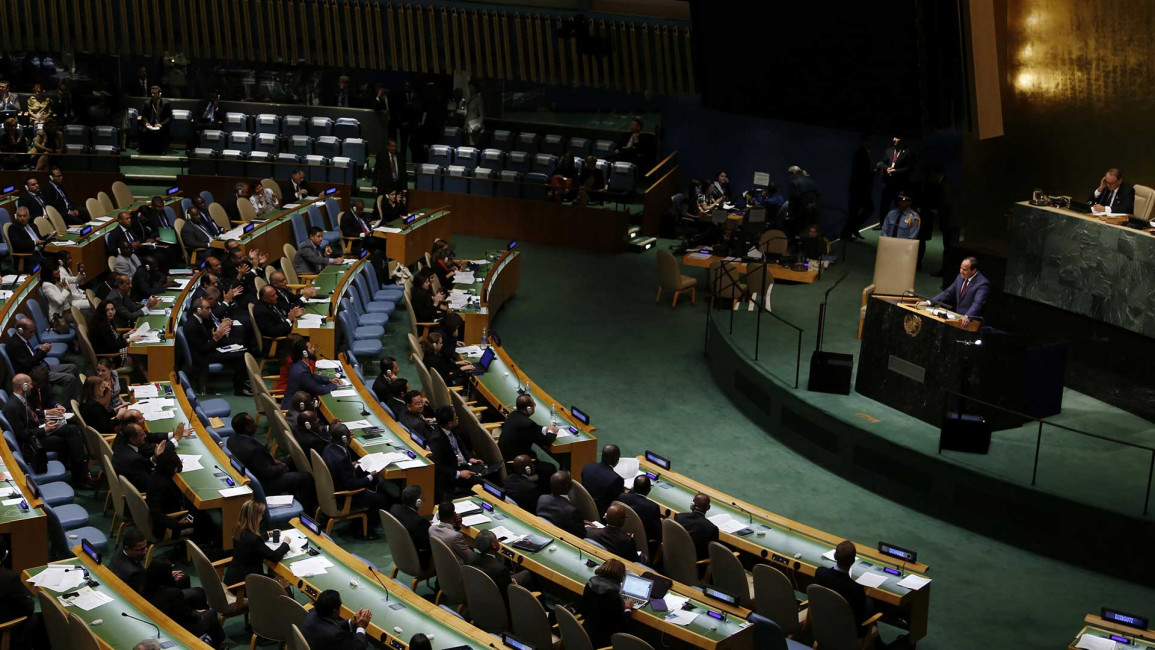
Sisi under the jackboot of history
Egypt's authoritarian regime this week decided to militarise state institutions, public facilities, petrol stations and power plants - and to threaten anyone who undermines such infrastructure with trial in a military court.
The state-controlled media has responded by creating a new wave of mass hysteria, with the government's decisions defended by hypocrites who benefit from the situation. Those familiar with Egypt will not be surprised by these moves.
Recent attacks in the Sinai have shown Egypt's administration to be a "wounded lion", which indiscriminately attacks anyone in its way, devouring society as it has eaten away at the state for more than sixty years.
Since General Abdel Fattah al-Sisi rose to power, he has failed in what he set out to achieve, which was ultimately to restore security in Egypt. Now he is trying to cover up his failures by mobilising the hysteria of the masses and enforcing fear on the rest.
His supporters appear on TV, attempting to justify the full-scale militarisation of society. Demands range from the forced expulsion of Sinai residents, which has already begun in Rafah, on the border with Gaza, to encouraging the Sisi government to impose de facto Emergency Law to eliminate any opposition voices, even in the military.
Lessons from the past
Power-madness has accompanied every military coup that has taken place in the past century. General Augusto Pinochet took to power in Chile in 1973, after overthrowing the democratically elected leftist President Salvador Allende. Pinochet dissolved all left-wing parties that supported Allende, and he practiced a range of political terrorism tactics against his opponents. Many fled and claimed political asylum in other countries.
During his rule, at least 25,000 people were imprisoned, while 3,000 disappeared. Pinochet was eventually Britain in 2002, and referred to a court in 2004.
Similarly, Rafael Trujillo ruled the Dominican Republic for nearly three decades. He was responsible for killing thousands of citizens and oppressing tens of thousands more before his assassination in 1961.
History repeated
General Sisi is going down the same path as the Chilean dictator, only much faster, which will soon lead to the end of the Egyptian president's rule. He shut down the public sphere with his notorious anti-protest law. He has killed and oppressed his opponents, and imprisoned tens of thousands of people.
Sisi's problems lie in his lack of confidence or ability to crush his opponents without real problems emerging. The man is apparently tense and afraid, despite his attempts to appear otherwise. He is also not entirely safe from conspiracies against him.
The alliance that supported him since the coup of 3 July 2013 is not only fragmented and divided, but also incapable of mustering the same support as it did a year ago.
| [Sisi] is apparently tense and afraid, despite his attempts to appear otherwise. |
But the main institutions - the interior ministry, the army, the judiciary, and the media - are not clear enough in their support to stop him from getting carried away with tension and recklessness.
These institutions may seem coherent and united in their support for Sisi, but their differences and conflicts cannot be concealed. These differences might explode if the general fails to achieve real results, which seems to be the case at the moment.
Let us not forget what happened to former dictator Hosni Mubarak who remained in power for 30 years, and yet when the deep-state institutions sensed that his collapse was imminent, they left him to fall from power and saved themselves.
We cannot rule out the same scenario from playing out in Egypt once again, no matter how hard the media tries to conceal this fact. Moreover, the increasing and indiscriminate oppression of all opponents to his rule, could not only allow for a fragmented opposition to reunite, but also lead to explosive consequences in society. This could take a few years to emerge, but it will eventually happen.
The end game
No dictatorship can survive without an exaggerated external enemy to be used to cover up its crimes. Just as General Pinochet created the left-wing enemy, Sisi is trying to convince the people of an Islamist enemy to justify the militarisation of the state and the subjugation of society.
Sisi is also attempting to distract the public from holding him accountable for his failures and lack of achievements.
Sisi's statements that Egypt is fighting a "war for existence" and that "more soldiers were killed and more will be killed", following the attack in the Sinai is a reflection of this distraction technique. Ironically, he did not dare to dismiss any official over this security failure despite the huge military presence in the Sinai.
If history is the wisest preacher, then Sisi and his followers should learn the lesson from Latin America, where the people overthrew dictators and resigned them to the scrap heap of history.
This article is an edited translation from our Arabic edition.
Opinions expressed in this article remain those of the original author and do not necessarily reflect the opinions of Al Araby Al Jadeed, its editorial board or staff.




